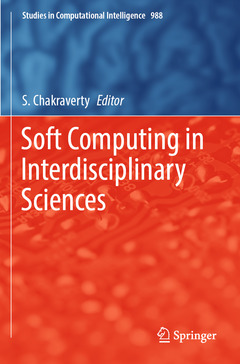Soft Computing in Interdisciplinary Sciences, 1st ed. 2022 Studies in Computational Intelligence Series, Vol. 988
Coordonnateur : Chakraverty S.

This book meets the present and future needs for the interaction between various science and technology/engineering areas on the one hand and different branches of soft computing on the other. Soft computing is the recent development about the computing methods which include fuzzy set theory/logic, evolutionary computation (EC), probabilistic reasoning, artificial neural networks, machine learning, expert systems, etc. Soft computing refers to a partnership of computational techniques in computer science, artificial intelligence, machine learning, and some other engineering disciplines, which attempt to study, model, and analyze complex problems from different interdisciplinary problems. This, as opposed to traditional computing, deals with approximate models and gives solutions to complex real-life problems. Unlike hard computing, soft computing is tolerant of imprecision, uncertainty, partial truth, and approximations.
Interdisciplinary sciences includevarious challenging problems of science and engineering. Recent developments in soft computing are the bridge to handle different interdisciplinary science and engineering problems. In recent years, the correspondingly increased dialog between these disciplines has led to this new book.
This is done, firstly, by encouraging the ways that soft computing may be applied in traditional areas, as well as point towards new and innovative areas of applications and secondly, by encouraging other scientific disciplines to engage in a dialog with the above computation algorithms outlining their problems to both access new methods as well as to suggest innovative developments within itself.
Professor S. Chakraverty has 29 years of experience as a researcher and teacher. Presently, he is working in the Department of Mathematics (Applied Mathematics Group), National Institute of Technology Rourkela, Odisha, as a senior (Higher Administrative Grade) professor. Prior to this, he was with Central Building Research Institute (CSIR), Roorkee, India. After completing Graduation from St. Columba’s College (Ranchi University), his career started from the University of Roorkee (now, Indian Institute of Technology Roorkee) and did M. Sc. (Mathematics) and M. Phil. (Computer Applications) from there securing the first positions in the university. Dr. Chakraverty received his Ph. D. from IIT Roorkee in 1992. Thereafter, he did his postdoctoral research at the Institute of Sound and Vibration Research (ISVR), University of Southampton, U.K., and at the Faculty of Engineering and Computer Science, Concordia University, Canada. He was also a visiting professor at Concordia and McGill universities, Canada, during 1997–1999 and a visiting professor of University of Johannesburg, South Africa, during 2011–2014. He has authored/co-authored/Edited 23 books, published 388 research papers (till date) in journals and conferences, two more books are in Press, and two books are ongoing. He is in the Editorial Boards of various International Journals, Book Series and Conferences. Professor Chakraverty is the chief editor of “International Journal of Fuzzy Computation and Modelling” (IJFCM), Inderscience Publisher, Switzerland, an associate editor of “Computational Methods in Structural Engineering, Frontiers in Built Environment” and happens to be the editorial board member of “Springer Nature Applied Sciences”, “IGI Research Insights Books”, “Springer Book Series of Modeling and Optimization in Science and Technologies”, “Coupled Systems Mechanics (Techno Press)”, “Curved and
Date de parution : 11-2022
Ouvrage de 257 p.
15.5x23.5 cm
Date de parution : 11-2021
Ouvrage de 257 p.
15.5x23.5 cm



